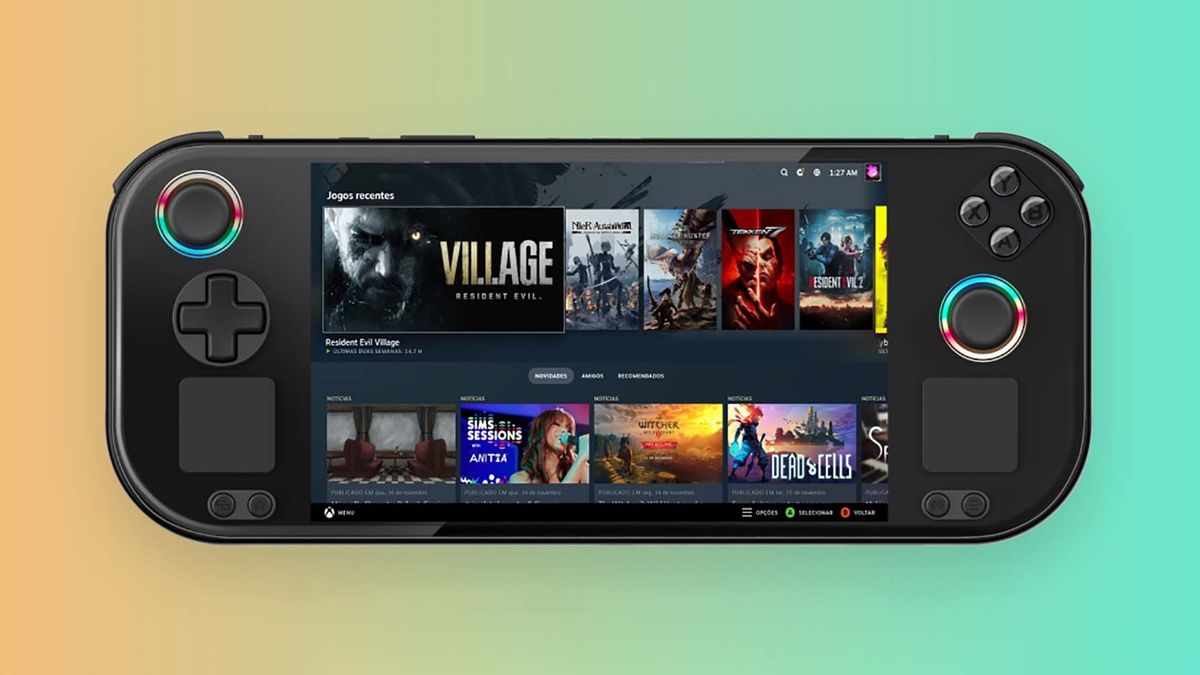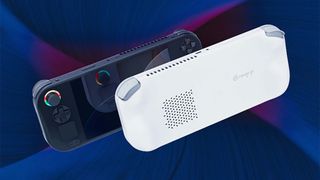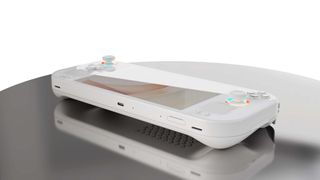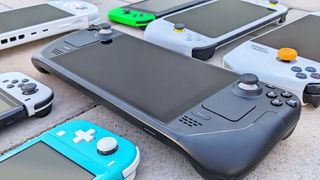Manjaro Linux gaming handheld is the biggest Steam Deck challenger yet
This is going to be the first direct Linux gaming handheld competitor to the Linux-based OS Steam Deck.

What you need to know
- As of right now, Steam Deck is the only main gaming handheld on the market that runs a Linux-based operating system.
- Manjaro is an open-source Linux operating system based off of Arch Linux, that is notable for its more user-friendly design.
- Recently, the Orange Pi Neo gaming handheld was announced, which will run on Manjaro Linux.
- The handheld will feature an AMD Ryzen 7 7840U in "Ultra Small and Ultra Slim" designs.
We've been seeing a whole horde of Windows gaming handhelds hitting the market over the last few months, in reaction to Nintendo Switch and Steam Deck success. However, for the first time since Valve's on-the-go gaming device hit the scene, we're finally getting another Linux-based gaming handheld in the form of the Orange Pi Neo. What's more, it will specifically run on the Manjaro Linux operating system, which really makes it the first direct competitor to the Steam Deck which runs a Linux-based OS.
Gaming on #Linux will be great on the #OrangePiNeo powered by @ManjaroLinux. More infos: https://t.co/1X5GIEKg2S pic.twitter.com/0uLou6SMLeFebruary 6, 2024
News of this Manjaro Linux gaming handheld was first announced on Feb. 6, 2024 via a tweet from Manjaro itself in which the caption read, "Gaming on #Linux will be great on the #OrangePiNeo powered by @ManjaroLinux. More infos: http://neo.manjaro.org".
A dive into the Neo Manjaro website further shows us some Orange Pi Neo specs. For one thing, it will be available in either a white or black casing in "Ultra Small and Ultra Slim" designs, so you can determine which design you like the look of most.

Colors: Black and white
CPU: AMD Ryzen 7 7840U
Screen: 7-inch FHD+ (1920 x 1200, WUXGA) 16:10, 500nits Brightness, 120Hz Refresh Rate
System: Manjaro Gaming Edition - immutable Update system via GamepadUI
RAM: 16GB/32GB LPDDR5 (7500MHz dual channel)
Storage: 512GB-2TB PCIe 4.0 NVMe M.2 SSD (2280)
Speakers: Dual 1W panoramic
Microphone: Dual array
Battery: 50WHrs, 3S1P, 3-cell Li-polymer battery
Joysticks/triggers: Hall Sensing/Linear Hall Trigger
Gyroscope: Dual 6-axis gyroscopes
Connectivity: Wi-Fi 6E, Bluetooth 5.3
Charger: PD-65W GaN
Cooling: Turbo Large Fan, Dual Copper Pipes + Aluminium Alloy Cooling Fans, extra large air vents + customized cooling system and air ducts with a subtle design
Ports: 2x USB 4.0 Type-C, 1x 3.5mm headphone jack, 1x microSD card slot
Dimensions: 259 x 107 x 19.9mm
Weight: Unknown
As far as the processor goes, it features an AMD Ryzen 7 7840U CPU, much like several AYANEO gaming handhelds on the market (such as the AYANEO KUN and AYANEO Flip line). It's worth noting that this R7 processor isn't as strong as the AMD Z1 Extreme found in Legion Go and ROG Ally, but it does operate well for handheld gaming.
Much like most other gaming handhelds on the market right now, Orange Pi Neo screen is a 7-inch display that can reach up to 500nits brightness. It also has a better 120Hz refresh rate than Steam Deck's max 90Hz as well as higher resolution of up to 1920 x 1200p compared to the Steam Deck's 1280 x 800p (basically 720p). So in this way it has an edge over Valve's handheld.
Of course, one of the biggest perks of this handheld is that it features the Manjaro Gaming Edition system, which is a Arch Linux-based software. Manjaro Linux is toted as being a far more user friendly program with an intuitive and simple design that makes it easy to navigate. In many ways, this could make the Orange Pi Neo a whole lot easier to use than the Steam Deck.
I'm floored to report that the Orange Pi Neo also features Hall Sensing joysticks as well as Linear Hall triggers, which means its controls shouldn't experience drift or have any frustrating issues of that kind. Unfortunately, drift is something that the Steam Deck can experience, so this is really important. The Orange Pi Neo also has haptic touchpads and dual 6-axis gyroscopes to add to the playing experience, which make it similar to Valve's handheld.
Get the Windows Central Newsletter
All the latest news, reviews, and guides for Windows and Xbox diehards.
Design-wise, ergonomic grips make the handheld comfortable to hold. While we don't currently know how much it weighs, we do know that it is smaller than the Steam Deck (298 × 117 × 49 mm), measuring in at 259 x 107 x 19.9mm, so it's possible it could put less pressure on your hands when held. As much as I love my Steam Deck, it is a husky, thicc boi that makes my hands cramp relatively fast, so a lighter Linux gaming handheld is appealing.


- Best gaming handhelds
- Best ROG Ally accessories
- Best Steam Deck accessories
- Best ROG Ally optimized games
- How to upgrade ROG Ally SSD
Of course, one of the biggest problems with gaming handhelds currently is short battery life and until the Orange Pi Neo comes in for testing, we won't know for sure how long it can last. It features a 50Whrs battery which is larger capacity than the Steam Deck's 40Whrs one. So it is possible that it can run a little longer. But that really depends on how the system runs altogether, what the system settings options there are, and what the minimum and max Thermal Design Power (TDP) options are.
As of right now, the Orange Pi Neo price and release date are unknown, but it wouldn't be surprising for the handheld to cost around the same as the Steam Deck LCD's 512GB version. Honestly, if it isn't competitively priced against its closest competitor then that could deter people from buying it. In regards to the Orange Pi Neo release date, my guess is that it could be this spring or summer. We'll report when Manjaro reveals more about it.

Self-professed gaming geek Rebecca Spear is one of Windows Central's editors and reviewers with a focus on gaming handhelds, mini PCs, PC gaming, and laptops. When she isn't checking out the latest games on Xbox Game Pass, PC, ROG Ally, or Steam Deck; she can be found digital drawing with a Wacom tablet. She's written thousands of articles with everything from editorials, reviews, previews, features, previews, and hardware reviews over the last few years. If you need information about anything gaming-related, her articles can help you out. She also loves testing game accessories and any new tech on the market. You can follow her @rrspear on X (formerly Twitter).